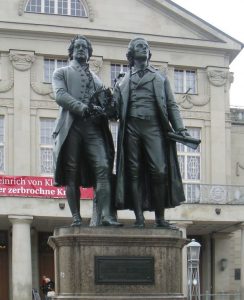
By Julia C. Kupper
The Duden, the most well-known spelling dictionary of the German language, will finally welcome the personal pronoun “Icke”, Berlin’s equivalent to “ich (I)”, into their ranks in its new addition.
The dialectal word will thus follow colloquial phrases such as “Moin Moin” (often used in Northern Germany for “Good Morning/Hello (Guten Morgen/Guten Tag/Hall0) and “schlotzen” (Swabian expression for drinking something with pleasure).
And since many of you might travel to Saxony and Thuringia this year on the occasion of the 500-year anniversary of The Reformation, we’ll introduce this month the Thuringian dialect to you.

The Thuringian dialect belongs to the linguistic classification of Central German and is mainly spoken in Thuringia, the green heart of Germany, but can also be found in parts of Saxony-Anhalt and Saxony. Subgroups of Thuringian include Central Thuringian, Northern Thuringian and Ilmthuringian. The Ilm is a small tributary of the river Saale and flows along my hometown .
Characteristics of the Thuringian Dialect:
- Letter “p” is often referred to as “b”, so the noun “Polizei” (police) becomes “Bolizei”
- Letter “t” is sometimes changed to “d”, for instance the noun “Tante” (aunt) becomes “Dande”
- Letter “k” is occasionally converted to a “g”, so the verb “kommen” (to come) becomes “gommen”
- Letter “b” is sometimes transformed into a “w”, so the conjunction “aber” (but) becomes “awer”
- Syllable “-tig” is readily converted to “-sch”, for example the adjective “fertig” (finished) becomes “fertsch”
Thuringian for Beginners:
- Bemme = sandwich
- Flotter Otto = diarrhea (literally: quick Otto)
- Betze = handbag
- Mutschekiebchen = ladybug
- Geigeln = to act foolishly
- Blem blem = to not be quite right in the head
- Mach’s Niggi in de Buchse = tuck your t-shirt in your pants
You can find out more about this dialect in the “Thuringian Dictionary”, a scientific project and an important reference book for linguists from the Friedrich-Schiller-University in Jena, Thuringia.